AI Castaway
Inside Microsoft's Fabric Event, Where Copilot Was the Star
The first-ever Fabric Community Conference was a showcase of emerging AI capabilities in Copilot and Azure. Here's how it looked from the event floor.
- By Ginger Grant
- 04/22/2024
Microsoft held its first Fabric Community Conference last month, and there was a big focus on AI by way of Microsoft Copilot.
Fabric is a relatively new product (it was released in November 2024) that combines the functionality of Power BI with Azure Synapse, Azure Data Factory and Azure Data Storage. Fabric is a Software as a Service (SaaS) data application designed to contain links to and storage for all of the data in an organization. It also provides tools for data engineering, machine learning and, of course, reporting.
Like many Microsoft projects nowadays, AI is being incorporated in a big way inside Fabric. Copilot, Microsoft's implementation of OpenAI's generative AI technology, underpins many different functions in Fabric. You can have Copilot create reports for you using your data, assist you in writing Spark, have it document descriptions for all of the fields in a semantic model, and write DAX code for you.
Access to Fabric is granted by changing an administrative setting in Power BI to enable Fabric functionality. Unfortunately, Microsoft does restrict availability based on the license; only users with a Power BI Premium ("P") SKU or Fabric Capacity ("F") 64 SKU or greater will be able to use Copilot in Power BI or Fabric.
AI in Azure
In addition to AI in Fabric, Microsoft talked about AI in Azure. In fact, it devoted an entire keynote to it.
Eric Boyd, vice president of Azure and AI at Microsoft, spoke at length about Microsoft's new product for developing with generative AI: Azure AI Studio, currently in public preview. This tool provides a number of different generative AI tools, including OpenAI's suite, Meta's Llama, Mistral, several of Hugging Face's models and various Microsoft AI foundation models.
One of the more interesting tools that is included in Azure AI Studio is the benchmark feature. This tool helps you find the right model for a given task by letting you specify what capabilities you need. It shows you the important elements of a model, including accuracy, coherence, fluency and Sim-GPT.
After this information is provided, Azure AI Studio will provide a score to all of the models it supports to determine which is the best tool for you, given your description of what problem you want the model to solve and how you rated the benchmark factors. You will also get a chart with the model accuracy, as shown here:
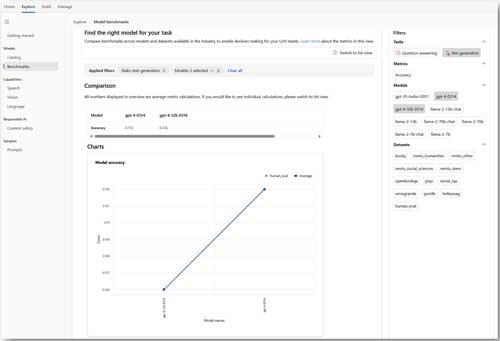 [Click on image for larger view.]
[Click on image for larger view.]
Once you have selected a model, Microsoft uses the data stored in OneLake, which was rolled out as part of Fabric, to train the generative model of your choosing on your data. OneLake is a version of Microsoft's Azure Data Lake Storage, which is meant to be the central repository for data inside an organization that uses Azure. OneLake contains the ability to add links to other non-Microsoft data sources.
Retrieval augmented generation (RAG) is made easier by the indexing functionality in Azure AI Studio. Marco Casalaina, Microsoft's vice president of Azure AI, gave a demonstration showing how to use this functionality to create a chatbot. Azure AI also includes a content safety service, which got its own demo. This tool lets you ground the AI by providing prompt shields and other grounding protections.
Azure AI Foundation Models
Naturally, Microsoft is interested in people accessing its own models, too.
The Azure AI foundation models demonstrated at the Fabric conference include a lot of interesting features, including many different options when it comes to speech, as shown in the image below:
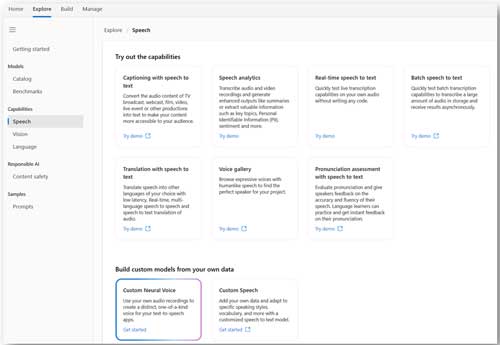 [Click on image for larger view.]
[Click on image for larger view.]
Two of the more intriguing features are custom neural voice and custom speech, which allow you to create a narrator based on your data.
Microsoft made it very clear in the keynote that it does not have access to your data, and that your data is not used in anyone else's model. To assure customers that the models do not contain copyrighted data, Microsoft will insure against copyright infringement claims made on your models by providing indemnification coverage against copyright claims relating to the use of content generated using AI.
At various keynotes and sessions throughout the Fabric conference, Microsoft demonstrated its commitment to incorporating Copilot into different tools and product features. The conference showcased many implementations of how AI can be used, all of which bode well for those of you hoping for wider adoption of AI technology.
Finally, for those of you who didn't get a chance to attend the conference, here are some scenes from inside the event:
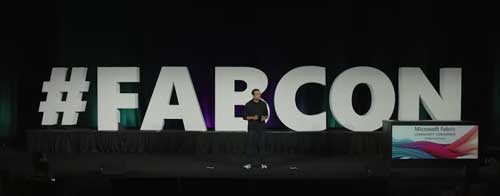 [Click on image for larger view.]
Arun Ulag, corporate vice president of Microsoft Fabric, giving the keynote address.
[Click on image for larger view.]
Arun Ulag, corporate vice president of Microsoft Fabric, giving the keynote address.
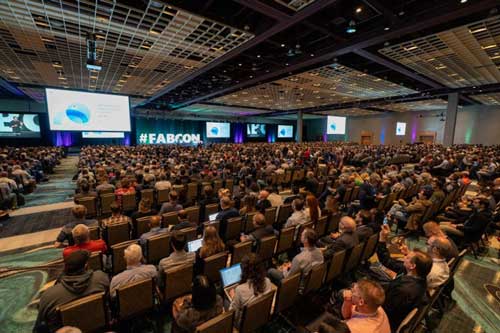 Another view of the very well-attended keynote from the back of the hall.
Another view of the very well-attended keynote from the back of the hall.
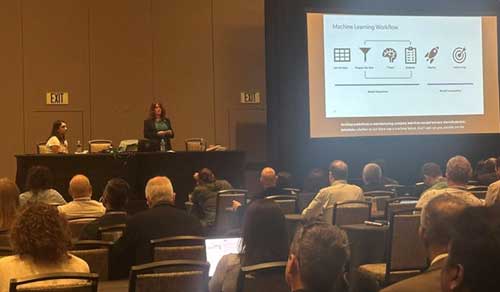 [Click on image for larger view.]
That's your columnist, in the green shirt, presenting during the conference.
[Click on image for larger view.]
That's your columnist, in the green shirt, presenting during the conference.
About the Author
Ginger Grant is a Data Platform MVP who provides consulting services in advanced analytic solutions, including machine learning, data warehousing, and Power BI. She is an author of articles, books, and at DesertIsleSQL.com and uses her MCT to provide data platform training in topics such as Azure Synapse Analytics, Python and Azure Machine Learning. You can find her on X/Twitter at @desertislesql.